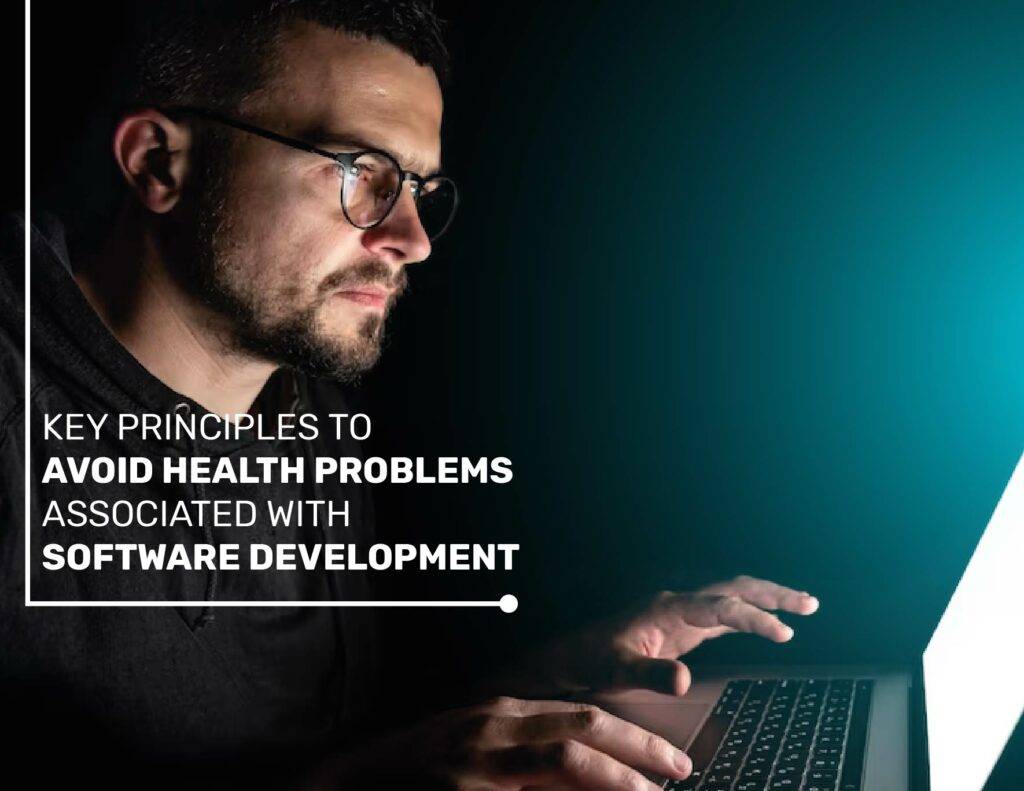As software engineers, it is normal to spend most of the day in front of a computer, usually spending time sitting on a chair for eight hours a day or probably even more. Likewise, after work, we’re probably sitting most of the night watching TV, working on a personal project, or just browsing the web. Work doesn’t require much physical activity other than walking to meetings, the bathroom, or the pantry for a snack. Mental stress from work also paves the way for overeating and eating snacks, which increases the risk of obesity.
The software engineering lifestyle is not necessarily glamorous and could lead to unhealthy habits. However, for every risk of sitting for a long time, there are remedies that can reduce its impact. These are some of the main health problems related to software engineers and modern digital workers.
Musculoskeletal problems
Most people don’t think about the time they spend in a chair until they have a problem, such as lower back pain or a stiff neck. For example, suppose you dropped something and leaned over to pick it up, causing your back to twist. The urge is to blame this action, but years of compensating for the bad posture meant some difficulty eventually had to arise.
If you think about your coworkers, you probably picture them hunched over their desks, looking at their screens. At the same time, on your trip home, you will see people with their heads down on their phones, whether standing or sitting. In this vein, technology is changing how we connect with people, but it’s also changing our bodies.
If you had to count the time you spend sitting on a chair, it would probably be around 11 hours, almost 70% of most people’s waking hours. Some people exercise after work, but unfortunately, 1 or 2 hours of exercise will not reverse the potentially harmful effects of being sedentary during the other hours.
Poor posture can cause postural kyphosis and can have harmful effects, such as developing adult kyphosis. Every inch you hold your head forward while bending adds 10 pounds of pressure on your spine. The rounded forward bending position causes the shoulder and neck muscles to become stiff adaptively.
Over time, cultivated stiffness can compromise your ability to straighten your spine. This rounded back can also compromise your ability to breathe completely and efficiently. This mechanical obstruction causes your body to breathe in short, shallow breaths, triggering the fight or flight state. This releases stress hormones that compromise your ability to return to a relaxed state.
Visual impairment
Looking at a computer screen all day can also cause damage to the retina. Computer screens and digital devices emit blue light. High-energy shortwave wavelength flashes and creates a glow that decreases visual contrast. This may be one of the reasons why tired eyesight, headaches, and mental fatigue are associated with prolonged exposure to the display (blue light exposed).
You blink less when focused on a screen, which can cause irritation and dry eyes. Blue light with wavelengths between 415 nm and 455 nm is closely related to eye-damaging diseases such as dry eye, cataracts, and age-related macular degeneration.
We should reduce screen time and take frequent breaks; wearing glasses that block blue light might also help. Consider talking to an eye doctor to see how you can protect your eyes.
Mental stress
In addition to the physical complications of the software engineer’s life, there are also mental complications. You may feel frustrated and stressed when you get stuck in a mistake or extremely pressured by tight deadlines. Stress activates your body’s fight or flight response, increasing your heart rate and adrenaline. Cortisol, a stress hormone, can cause fat to build up in the abdomen.
Stress on the mind can also cause sleep interruptions.
Lack of sleep good sleep can aggravate stress levels. Software engineers tend to be on the computer all day and continue to be in front of a screen after their work hours have finished receiving high doses of blue light up to late hours at night. This high-energy blue light is similar in wavelength to the light emitted by the sun during the day, inhibiting the secretion of melatonin and increasing the production of the adrenocortical hormone, making it harder for people to fall asleep and disrupting their sleep-wake cycle.
Poor food choices
When you focus deeply on ways to solve a code problem, the last thing you want to do is to prepare a meal. When the body is stressed, the brain thinks it needs fuel, so eating food becomes a relief for common stress. High-calorie and low-nutrient snacks are often convenient to eat.
You might find yourself eating a snack when you’re stressed about something. Eating sweets provide a small release of dopamine in your body for immediate comfort, but it also raises your insulin levels, making your body less sensitive to insulin over time, which can lead to diabetes if it becomes chronic. Excess sugars are stored as fat in your body, leading to weight gain. When comforting carbs, such as cookies and chips, are easily accessible because they are pre-packaged and do not require work to prepare, it is easy to overeat.
Not surprisingly, overeating combined with a sedentary lifestyle will result in more than just weight gain. Sitting too much shortens life; the CDC also reports that we’re spending 75 cents of every dollar on health care for chronic conditions related to sedentary behavior, such as obesity, diabetes, and heart disease. If we made minor changes to be more active, it could reduce the amount of money spent on these diseases due to lifestyle decisions.
Changes you can make
As you can see, a desk job causes many physical and mental tensions. But it’s never too late to solve a problem, desperate as it may seem. A few key changes can mean the difference between a healthy and active life or prolonged discomfort. These are a few of them:
Ergonomic desk and physical activity
The first step is to notice when you’re slouching on your desk. When you feel pain in your neck, imagine pulling a thread from your crown. That will ease the tension a little. Other points are:
- Reduce optional seats in your life.
- For every 30 minutes at your desk, move for at least 2 minutes.
- Prioritize position and mechanics whenever you can.
- Perform 10 to 15 minutes of daily maintenance on your body.
Rethinking food choices
Start noticing when you’re stressed and how you react to it. It’s important to be in tune with your body to understand your urges. When you realize what’s happening, you can make better decisions.
Instead of choosing milk chocolate, choose a healthier snack like fruits, nuts, dark chocolate, yogurt, etc. Eating fewer carbs will also help prevent weight gain because carbohydrates (particularly simple and processed ones) drive the body to release insulin. In turn, they signal fat cells to ingest and store excess calories.
Make healthy foods more available by choosing low-carb alternatives, or pack your bags of snacks that are full of nutrients. When you slow down your carbohydrate intake, you’ll crave them less. The idea is to increase the protein and vegetable portions and decrease the number of carbohydrates. In addition, some people eventually choose to remove all unnecessary added sugars from their diet.
Sitting in front of a computer while you have lunch is not a great idea either. People tend to overeat when unaware of what they eat and how much they eat. Eating slowly may allow your brain to pick up when you are full, as it happens, not several minutes later. And don’t worry about leftovers; you can always eat them later. Having nutritious foods is better than eating unnecessary calories.
Practice mindfulness
Social activities like walking with coworkers for coffee or enjoying the sun can help relieve stress. Shows like «Silicon Valley» and «Mr. Robot» portray programmers as socially awkward, but most of us don’t fit that stereotype.
Spending a lifetime talking to a computer is unhealthy because humans are social creatures. We need positive social interactions to thrive and not run out. Especially after the COVID-19 pandemic, it can be refreshing to talk to another human being, even during a happy hour with your team at Google Hangouts.
Consider including meditation in your daily life. Meditation will help you stay calm and curb your urges to look for a chocolate bar whenever you feel stressed. It can also help you sleep better.
Maintaining a healthy lifestyle, staying attuned to your feelings and needs, and becoming more active throughout the day will help you become a healthier software engineer. Health is more important than anything else. Do not allow the ergonomic and mental aspects of work to inhibit your ability to live better.
This article is for informative purposes only and is by no means to be considered a piece of health advice. Consult with your physician about your health-related problems.


